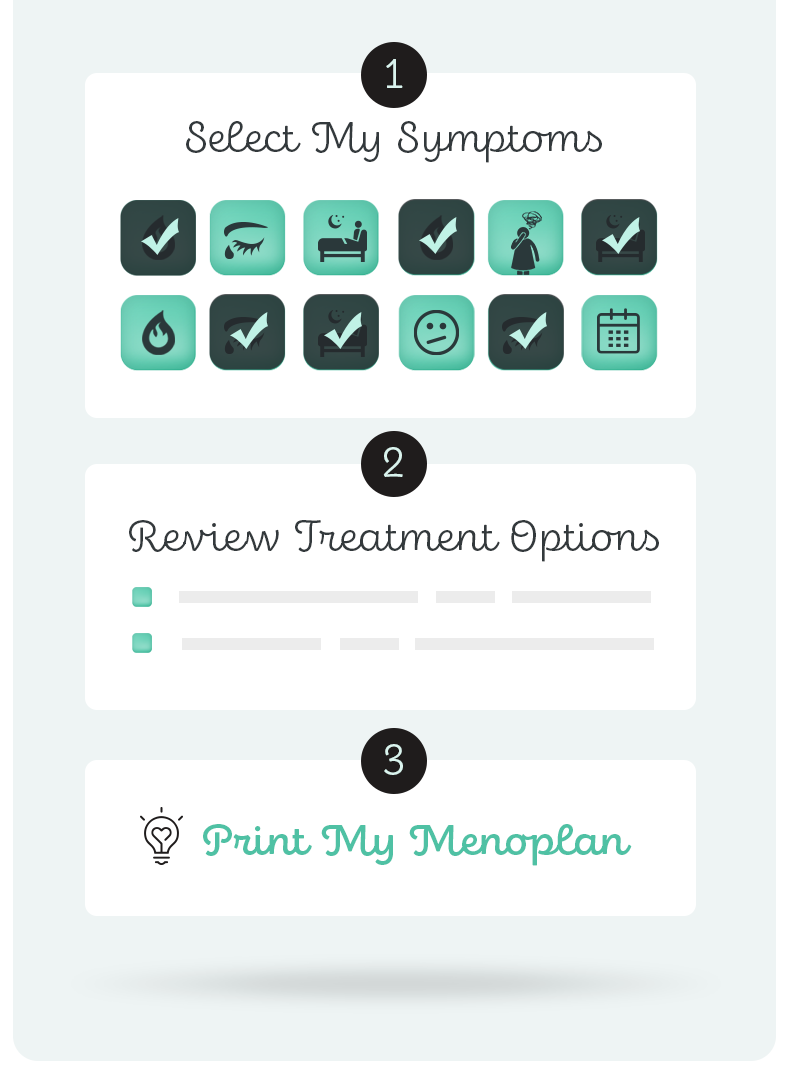Treatments
MEDITATION, MINDFULNESS, MINDFULNESS-BASED STRESS REDUCTION
WHAT IS IT?
Mindfulness-based stress reduction (MBSR) teaches you to be aware of your thoughts, feelings, and sensations. You set aside being reactive or judgmental. It can help you have more choice and take wise action in your life. You can develop a non-judgmental acceptance and “open-hearted” experience. The goals are to increase well-being and reduce suffering and distress. It is known for helping people with stress, anxiety, depression, and pain.
MBSR is most often taught in a 6 to 8-week course. It combines mindfulness meditation, body awareness, yoga and exploration of patterns of behavior, thinking, feeling and action.
Meditation and mindfulness are used to reduce stress. They include focused breathing or belly breathing, body scanning, guided imagery, prayer, and other techniques.
OUR BOTTOM LINE: DOES IT HELP?
MAYBE. Mindfulness-based stress reduction may improve overall quality of life for women with menopause symptoms. It may help you sleep better and put you in a better mood.
NO. MSBR will likely not decrease the number or severity of hot flashes and night sweats.

SLEEP PROBLEMS & INSOMNIA
Mindfulness training has been shown to improve sleep for adults. However, research is needed on women in menopause.

MOOD, ANXIETY & DEPRESSION
While not studied specifically in menopausal women, there is some evidence that mindfulness-based stress reduction can help decrease depression and anxiety.

WEIGHT LOSS
Mindfulness-based stress reduction and meditation have helped people lose about 7 pounds in the short-term on average. It is usually combined with another approach, like changes in diet. Indeed, there are programs that combine the two by promoting mindful eating, which can be effective in reducing impulsive eating. Long-term effects of MBSR on weight loss maintenance are not known. The studies were not specifically about menopause-related weight gain.

HOT FLASHES AND NIGHT SWEATS
MBSR does not seem to decrease hot flashes, night sweats, or the severity of these symptoms.

ACHES AND PAINS
Evidence thus far indicates that MBSR does not decrease pain.
POTENTIAL RISKS & SIDE EFFECTS
There are no know risks of MBSR.
QUALITY OF LIFE EXPECTATIONS
There is some evidence that MBSR may help with overall menopause related quality of life.
IF I WANT TO TRY THIS TREATMENT WHAT ARE MY NEXT STEPS?
Classes and programs in MBSR are widely offered. Look for them at hospitals, retreat centers, yoga facilities and meditation centers. Books and on-line programs can also suggest how to use mindfulness.
, , , and (2018) Mindfulness‐based interventions for weight loss: a systematic review and meta‐analysis. Obesity Reviews, 19: 164– 177. doi: 10.1111/obr.12623.
Goldberg SB, Tucker RP, Greene PA, Davidson RJ, Wampold BE, Kearny DJ, Simpson TL. Mindfulness-based interventions for psychiatric disorders: A systematic review and meta-analysis. Clin Psychol Rev. 2018;59:52–60. doi:10.1016/j.cpr.2017.10.011. PMID: 29126747
Strauss C, Cavanagh K, Oliver A, Pettman D. Mindfulness-based interventions for people diagnosed with a current episode of an anxiety or depressive disorder: a meta-analysis of randomised controlled trials. PLoS One. 2014;9(4):e96110. Published 2014 Apr 24. doi:10.1371/journal.pone.0096110
Bawa FL, Mercer SW, Atherton RJ, et al. Does mindfulness improve outcomes in patients with chronic pain? Systematic review and meta-analysis. Br J Gen Pract. 2015;65(635):e387–e400. doi:10.3399/bjgp15X685297
Wong C, Yip BH, Gao T, et al. Mindfulness-Based Stress Reduction (MBSR) or Psychoeducation for the Reduction of Menopausal Symptoms: A Randomized, Controlled Clinical Trial. Sci Rep. 2018;8(1):6609. Published 2018 Apr 26. doi:10.1038/s41598-018-24945-4
Chen KW, Berger CC, Manheimer E, et al. Meditative therapies for reducing anxiety: a systematic review and meta-analysis of randomized controlled trials. Depress Anxiety. 2012;29(7):545–562. doi:10.1002/da.21964
Goyal M, Singh S, Sibinga EM, et al. Meditation programs for psychological stress and well-being: a systematic review and meta-analysis. JAMA Intern Med. 2014;174(3):357–368. doi:10.1001/jamainternmed.2013.13018
van Driel C, de Bock GH, Schroevers MJ, Mourits MJ. Mindfulness-based stress reduction for menopausal symptoms after risk-reducing salpingo-oophorectomy (PURSUE study): a randomised controlled trial. BJOG. 2019;126(3):402‐411. doi:10.1111/1471-0528.15471
Ruffault A, Czernichow S, Hagger MS, Ferrand M, Erichot N, Carette C, Boujut E, Flahault C. The effects of mindfulness training on weight-loss and health-related behaviours in adults with overweight and obesity: A systematic review and meta-analysis, Obesity Research & Clinical Practice, 11, 5, Supplement 1, 2017, p. 90-111, ISSN 1871-403X, https://doi.org/10.1016/j.orcp.2016.09.002.
Schell LK, Monsef I, Wöckel A, Skoetz N. Mindfulness-based stress reduction for women diagnosed with breast cancer. Cochrane Database Syst Rev. 2019;3(3):CD011518. Published 2019 Mar 27. doi:10.1002/14651858.CD011518.pub2
Authors: Dr. Katherine Newton, & Dr. Leslie Snyder. Last reviewed February 15, 2021



